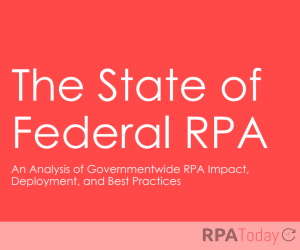
The United States government has more than doubled the number of RPA automations deployed by its various agencies from 2019 to 2020, nearly tripling the number of hours saved by employees who can shift their attention to higher-value work, according to a new report.
The State of Federal RPA, issued by the RPA Community of Practice (CoP) established in June 2019 by the General Services Administration (GSA), is the inaugural edition of a comprehensive annual look at how the federal government’s RPA efforts are progressing.
In addition to presenting a baseline set of metrics that will enable the government to measure the effectiveness and growth of its automation deployments every year, the report also offers a framework for measuring the “maturity” of RPA efforts, creating a way to calculate ROI, how agencies can accelerate RPA programs and the challenges that might prevent future adoption and growth of RPA across the federal government.
“GSA has built one of the largest federal RPA programs,” said Gerard Badorrek, CFO of GSA and federal RPA CoP sponsor. “It has deployed 70 automations totaling over 200,000 hours in annualized capacity. The Federal RPA Community of Practice seeks to replicate this experience across the government. The CoP pursues a two-fold mission to share best practices and lessons learned, as well as to break down common technology and management hurdles that can slow RPA deployment.”
The study assessed eight characteristics that assessed RPA maturity across 23 government agencies: automations in production, annualized hours of workload reduction, process improvement capabilities, program impact, opportunity identification, production environment, security and technology approach, and intelligent automation capabilities.
Key findings include:
- RPA program maturity increased across government by 70 percent in one fiscal year
- The ROI of automations deployed increased 110 percent in new automations, which resulted in a 195 percent increase in hours saved
- Once robots are deployed to support an agency, demand for more automations increases
- RPA with intelligent automation has had limited success
- Security of robots is still a challenge

